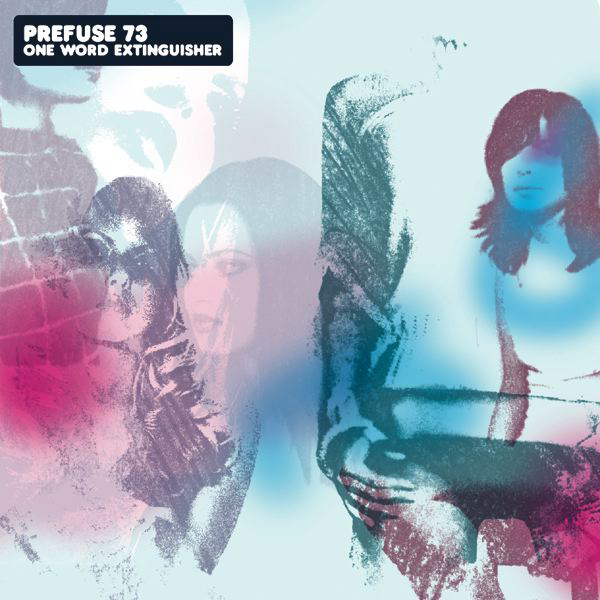
This is an album I'm really digging right now. Pitchfork gave it a 9.1:
Up to now, Scott Herren-- the shy, lanky Atlantan responsible for Prefuse 73's fabulous glitch-hop debut
Vocal Studies + Uprock Narratives-- hasn't made his name as a purveyor of confessional music. The closest he ever came was the laptop catharsis of Delarosa and Asora, which had no secrets to tell; rather, its intricacies of meter and texture gave your head something to do while your guts spilled out over it.
Vocal Studies + Uprock Narratives was hard-edged and fast-cutting, immersed in early rap techniques and sensibilities; it didn't express feelings, it steamrolled them. But
One Word Extinguisher shows a range of emotional grappling usually foreign to instrumental hip-hop. It's clear that Herren was coming back to the studio night after night not just for skills and thrills, but for a measure of solace. Make no mistake: This is a breakup record.
"The never-ending battle" is what Herren calls the break-up that lasted for the year-plus during which this album was in production. "I locked myself in my room working, disconnected the phone, bummed out as fuck," he told CMJ in March. "You can't talk to anybody, you feel like shit, and it's the only thing you have to express yourself." A year of unspeakable suffering channeled into sixty ripe minutes: In the hands of anyone else, it could be torture. This sorrow, however, sparks with a sweeping wail of queasy ahhh's that carry stunted hopes for a soon-to-be-doomed relationship. Vocal scraps and a blood-curdling scream announce the descent of the mask of hip-hop rage, as an eightfold synth-scribbling bomb drops right into "The End of Biters", the first of several sucker-punching cutfests in the illustrious tradition of the edit record. Next comes Diverse's self-absorbed "Plastic", a screed that rails with righteous indignation against "pop trends and predetermined top-tens." All this over-the-top rebuke is obviously an escape from something.
Things begin to come into focus as "Uprock and Invigorate" bounces in with its edges exposed. Warm, fretless bass, flitting Rhodes, drizzling sawtooth, and a brittle snare become intent on stocking up and locking down with every passing bar. But beneath the surface lies a hint of tension between the percussive exoskeleton and its syrupy core, an orderly contest of soul-versus-machine that momentarily eclipses the sense of loss. The rest of the album projects this kind of tension into a giant battle of the sexes. "The Color of Tempo" mangles its feminine samples with a virile beatbox pattern; "90% of My Mind Is with You" breaks up heavy panting with a deliberately difficult, meter-defying beat, and ends with a series of mournful, defeated R&B samples. There can be no more doubt when, on "Female Demands", a girlfriendish voice casually tells Herren to "fuck with the beat here" only to be throttled by digital effects; the rest of the track feels like a giant damaged gynorcism. Before we know it, we're desperately trying to forget her, bumping with another woman who croons "you... you... you..." on the offs.
Meanwhile, straight meters are often sprinkled with triplet ligaments, propelling the beat with an uncommonly light touch. But Prefuse's rhythmic sophistication isn't just about alternating threes and fours-- as the lesson goes, it takes two interlocked meters to make African music. While Herren rarely tries to stand up in two meters at once, he often relies on the juxtaposition of mildly divergent rhythmic feels within the same beat, proving his mastery of some of the subtler tensions available to the instrumentalist. This gives him access to some very subtle tensions-- though many tracks seem like tricks to distract us from the ongoing devastation. Sooner or later, it sinks in that we're in the company of an emotional fugitive, sealed in a room with machines whose perfect control, he is convinced, will allow him to avoid the inevitable emotional reckoning. Through scorn and bombast, through distraction and self-parody, through the sheer weight of craft, this Prefuse tries to wear his sorrow down, to crush himself, to explode the emptiness. A thrilling listen, but how could such a mission succeed?
I'm not sure how he did it. There's a glimmer of hope in the open restraint of "Choking You", a sawtooth shuffle scattered with chirpy, chalky bits. Another late track calls a gender truce, as a skeletal crunch frames some lightly doctored female vocals, giving a cold, sweet impression, like melon rinds left out in the rain. And the last track, in spite of its metric and sexual duplicity, offers a baffling promise of balance. Unexpectedly, the music becomes its own consolation. (PitchforkMedia)
Download Part 1
Download Part 2









